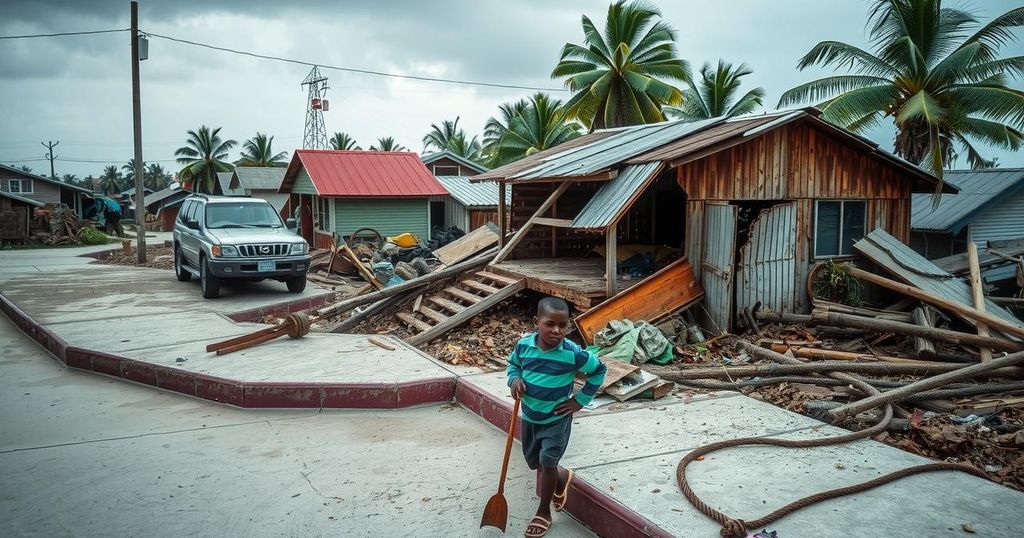Cyclone Chido Devastates Mozambique, Impacting Over 90,000 Children

Cyclone Chido has caused extensive destruction in Cabo Delgado, Mozambique, affecting over 90,000 children and destroying 35,000 homes. The cyclone compounded existing challenges from conflict and health emergencies. UNICEF highlights the urgent need for humanitarian assistance, estimating that 4.8 million people require support. The storm’s devastation raises concerns about food insecurity and the worsening cholera outbreak in the region.
As Cyclone Chido struck Cabo Delgado province in northern Mozambique, the repercussions have been devastating. Over 35,000 homes have been damaged or destroyed, profoundly affecting more than 90,000 children. The cyclone’s impact, which included heavy winds and torrential rainfall, also resulted in the destruction of at least 186 classrooms and severely impacted 20 health facilities, compounding an already dire humanitarian situation.
Mary Louise Eagleton, the UNICEF Representative in Mozambique, highlighted that the country is among those most severely affected by climate change. She noted that children were already facing critical challenges such as conflict, drought, and disease outbreaks before the cyclone hit. In response, UNICEF, in collaboration with the government and various humanitarian partners, is prioritizing urgent humanitarian assistance amidst these mounting challenges.
Cyclone Chido made landfall near the city of Pemba, inflicting significant damage on infrastructure and disrupting electricity and communications. The province has been enduring prolonged conflict for the past seven years, resulting in over 1.3 million people being internally displaced, with women and children representing 80% of those affected. The cyclone also wreaked havoc across Nampula and Niassa provinces, impacting over 25,000 families by causing power outages and damaging water facilities, worsening the ongoing cholera outbreak in the region.
Looking ahead, projections indicate that nearly 3.3 million people in Mozambique will face “crisis” or higher levels of food insecurity next year, exacerbated by weather patterns associated with El Niño. Current estimates reveal that approximately 4.8 million people require humanitarian assistance in Mozambique, including 3.4 million children. The recent cyclone adds to a growing number of climate-related disasters in the region, such as Cyclone Freddy, which struck in 2023, underscoring the increasing frequency and intensity of such events due to climate change.
UNICEF is actively working to assist distressed communities and children as the situation evolves, urgently requesting US$10 million to support its emergency response efforts to mitigate the impact of Cyclone Chido and other ongoing crises in the country.
The context of this report highlights the devastating effects of Cyclone Chido, which has exacerbated an already precarious situation in Mozambique. The country, particularly the Cabo Delgado province, has been facing a myriad of challenges, including climate change impacts leading to extreme weather events, prolonged armed conflict, and public health emergencies. The compounded effects of these factors have left millions of Mozambicans, especially women and children, vulnerable and in need of immediate humanitarian assistance. The ongoing humanitarian crisis in Mozambique necessitates coordinated efforts from local and international partners to alleviate the suffering and provide essential services to affected populations.
In summary, Cyclone Chido has inflicted substantial damage in Cabo Delgado, with over 90,000 children affected and thousands of homes destroyed. The cyclone compounds existing humanitarian crises, including internal displacement, health concerns, and food insecurity. Uruguay relies on the collaborative efforts of UNICEF, the government, and humanitarian partners to provide urgent assistance. With growing climate challenges and increasing frequency of extreme weather events, the need for humanitarian support and resilient recovery strategies becomes increasingly critical for vulnerable communities in Mozambique.
Original Source: reliefweb.int








